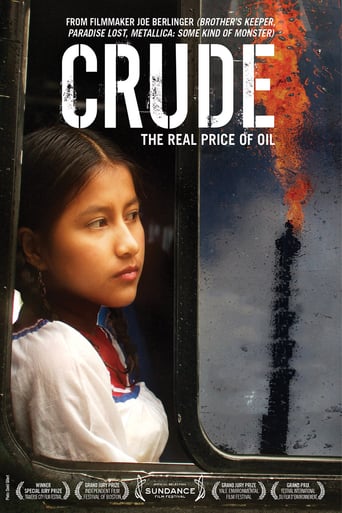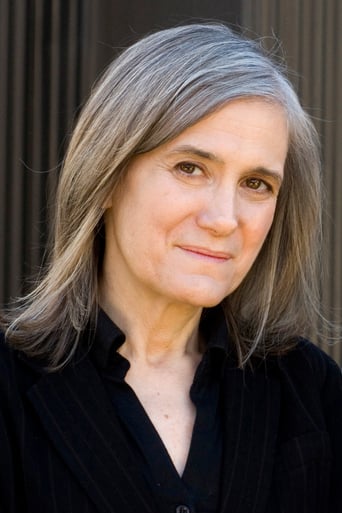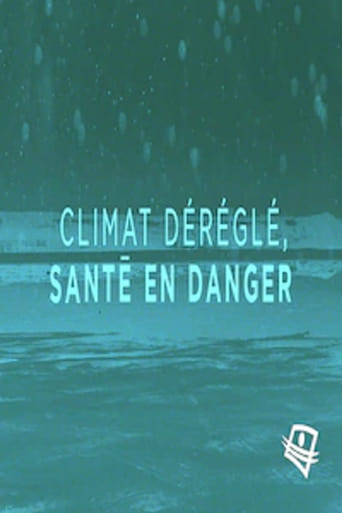The story of lawsuit by tens of thousands of Ecuadorans against Chevron over contamination of the Ecuadorean Amazon.


Similar titles
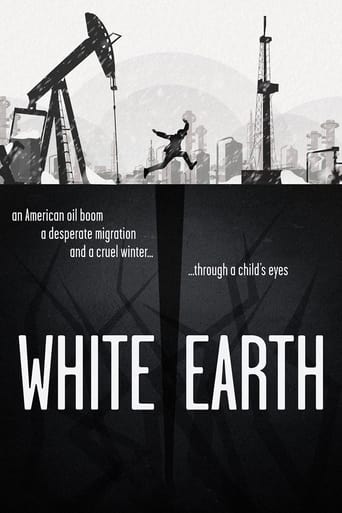
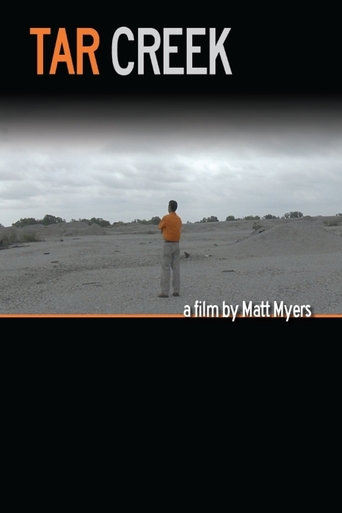
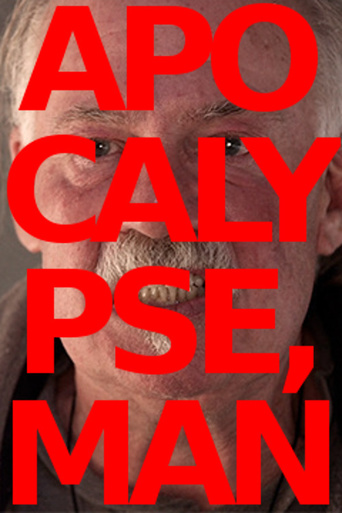
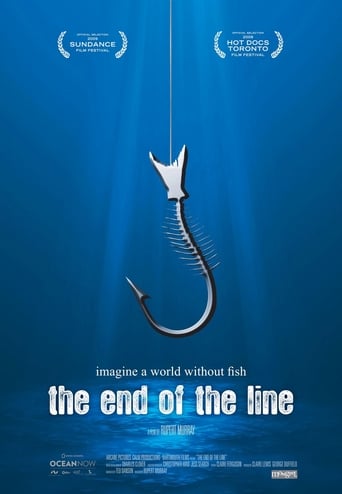
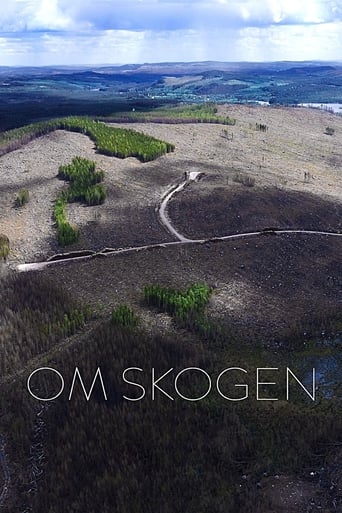
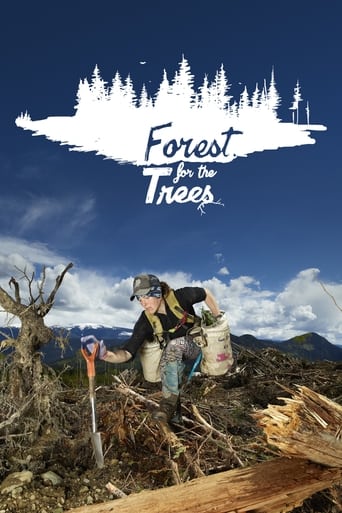
Reviews
Joe Berlinger's "Crude" follows the campaign of several litigators as they work on behalf of the people of Ecuador to win a class action lawsuit against Texaco oil."Crude" begins in 1964, with Texaco's arrival in Ecuador. In 1972 the company begins working in the Lago Agrio oil fields, actions which slowly usurp the lives of the indigenous populace. Over the decades, Texaco leaks toxins and waste into neighbouring rivers, which of course lead to mutations, deaths and disease. Texaco subsequently transforms into a mega-corp called Chevron. Later the Lago Agrio fields are handed over to a company called PetroEcuador.At its best, "Crude" maps a dispiriting, daunting, decades-long campaign against a mega-corporation with seemingly infinite resources at its disposal. Elsewhere Berlinger teases out Chevron's ingrained hypocrisy, several of its spokesmen deeply steeped in denial. The company would later accuse "Crude" of being dishonest propaganda, the documentary's claims based on bribery and coercion. While there is some truth in these claims - Ecuador's government are as complicit as Texaco, and most of the "environmental lawyers" Berlinger shows us are acting wholly out of self-interest - this does not absolve Chevron of blame.8/10 – See "All Watched Over By Machines of Loving Grace".
In the past 15 (or so)years,Joe Berlinger has certainly crafted his share of eye opening,edgy documentaries. From 'Brothers Keeper',to 'Paradise Lost',and 'Metallica:Some Kind Of Monster'(all co-directed with Bruce Sinofsky),and now,'Crude'. The film concerns a village in Amazonian South America (located in Ecuador)that attempts to take the oil giant,Chevron to court to sue for environmental damage & the mass destruction it has done to both the infrastructure,as well as the cancer that has resulted in Chevron's dumping of toxic oil spills in the water supply for the people who live in the various villages there. We get to view the talking heads on both sides of the argument (the villagers,the environmental advocates,as well as the oil companies and their scuzzy,bottom feeding, corporate ambulance chasers that back them up). Along the way,we are also treated to some vintage clips from Chevron's promotional films,which were generally screened to their stock holders at various meetings over the years,with countless misleading messages. As with other documentaries directed by Berlinger,some unpleasant video footage of the horrors of environmental rape brought on by careless dumping of toxic materials are to be expected (this is NOT a film for munching popcorn by,so be prepared). Spoken in Spanish with English subtitles,as well as English. Not rated by the MPAA,but contains some upsetting footage of the devastation of environmental damage & the horrors that result. Not a good choice for small children.
This documentary about the Chevron-Texaso case and the struggle of a small law company trying to win a lawsuit against this oil giant and force them to take responsibility for the ecologic catastrophe they left behind when drilling oil in the Ecuador Amazon rainforest, leaving behind open or poorly sanitized oil pit holes, near or on top of – yes, you heard me, on top of – which people live and suffer from severe illnesses such as cancer, leukemia, or severe skin problems as a result.Amazing documentary, amazing story, which has so much reminded me of the courageous fight of David against Goliath combined with a sprinkle of Erin Brockowich. Amazing how a few can move mountains to help total strangers at a country far away from their ordinary world...
In Joe Berlinger's film Crude, we're privy to a situation that has spiraled out of control and how a battle is waging between lawyers on two sides. On one side are the Ecuadorians who in 1993 filed a lawsuit against Texaco (now Chevron) for their hazardous practices while drilling for oil by spilling all over (ultimately far more than Exxon Valdez) and contaminating the water that the locals drank and bathed in. They sought (still seek, actually) just some responsibility, something on their end that "hey, we screwed up, we'll clean it up," and eventually in recent years given representation by Pablo Fajardo, a tough Ecuadorian lawyer, and some American back-up lawyers.On the other side, of course, are the corporate lawyers for Chevron, who claim two contradictory things: there's the Chevron environment scientist who says that there is no contamination, the people are getting cancer from other things, no sewage treatment, people get sick all the time, etc, don't blame us - and there's the local Chevron Ecuadorian lawyers who say, 'yeah, there is contamination, but not by us, look at Petro-Ecuador, who came after we left, it's all them.' It comes down to a blame game that, finally, after years of struggle, gets to a trial level in Ecuador. But this, as we see in Crude, has its problems too - not least of which from corruption in the law system, and judge(s) inundated with information to process from the case.What makes Crude so powerful a document, and an indictment of a mighty beast like an oil corporation that is in fact one of the largest corporations in the world, is that Berlinger doesn't need to amp up the agitprop. We see the Chevron scientist or lawyers try their best to describe how things aren't bad, or so bad, or that it's not their fault, and all Berlinger has to do is show the local Ecuadorians living right by the water, too poor to move or to be able to get enough money form their livestock who die off immediately (and asking "where are all the fish" answers itself), the mother who has two children lost to cancer, and shots, very straightforward, of, yes, contaminated oil wells and ponds and places that no one should have to put up with. Berlinger gets his best material from these horrid images, set against the backdrop of an otherwise gorgeous Amazon jungle and rain-forest.It's also a gripping legal drama, and one that we see gains some public-attention traction following a Vanity Fair article in their 'Green Issue' and a subsequent interest from Trudie Styler and her husband Sting (more so Styler, who goes to Ecuador and sees the anguish of the people and the sites of the oil spills). But one may be filled with a possibly cynical sense of dread; for all of the hope one may have in this case, that David will for once beat Goliath and that the things the American lawyer are saying will come true, it's real life and not the movies (albeit as a movie here) and it's nail-biting to see how it will turn out, that despite all of the attention and media buzz thanks to Sting, it won't work out for the Ecuadorians because, well, it's a damn oil monster they're up against.As it turns out, it's really a credit to Berlinger and his crew that he can present such a story with a clear eye and head and, indeed, be fair on both sides (granted, there is only so much access an oil company in litigation will give to a low-budget documentarian), and lets the audience see what the case is all about. And, perhaps expectedly, the ultimate bittersweet note by the end is that of a double-sided coin: an independent investigator may find overwhelming proof of contamination and the need for compensation for the victims and people and lands... but the case still needs to end, and as it stands, the investigation is ongoing. It's a harrowing saga of human rights.
